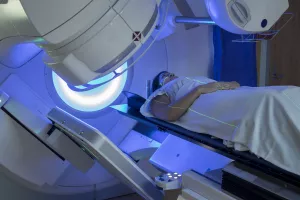Nuclear medicine uses very small and safe amounts of radioactive material to diagnose conditions and look for other abnormalities in your body. It can also destroy harmful tissue caused by certain thyroid conditions and cancers.
Minimal radiation offers maximum information
Nuclear medicine offers people living with advanced conditions a 3-for-1 benefit — not only does nuclear medicine give us a clear picture of your organs but it also identifies how well they're working and what needs to be treated.
Nuclear medicine is as safe as it gets. Your radiologist will use the minimum radiation necessary (usually similar to the amount you're exposed to during an X-ray) to evaluate how parts of your body react to radiation.

Conditions
Nuclear medicine is used to detect, diagnose and treat a variety of diseases. It allows us to examine and evaluate:
Testing
Nuclear medicine uses a radioactive material called a radiotracer to illuminate your insides. Depending on what we’re evaluating, the radiotracer will be injected into a vein, swallowed or inhaled as a gas.
The radiotracer helps visualize your insides by latching onto proteins in an affected area. We use a special camera or imaging device that produces pictures and provides information at a molecular level.
By understanding your health at a molecular level, we can diagnose serious conditions before they progress and pinpoint treatment to where it’ll be most effective.

From regular office visits to inpatient stays, find the healthcare you need and deserve close to home.

Meet the doctors and care team devoted to supporting you every step of the way along your path to better health.